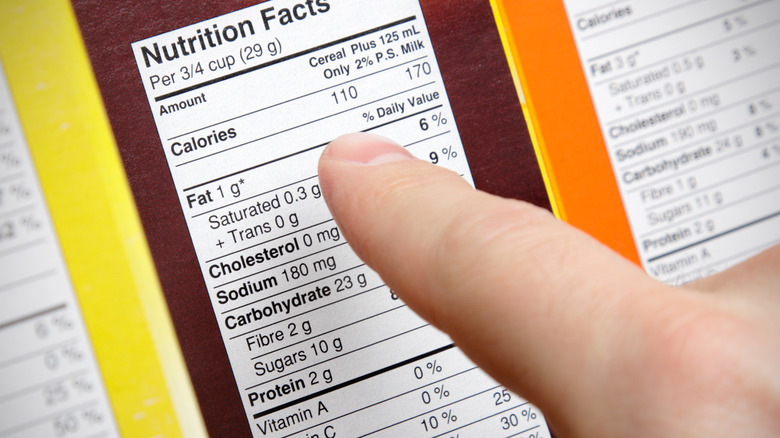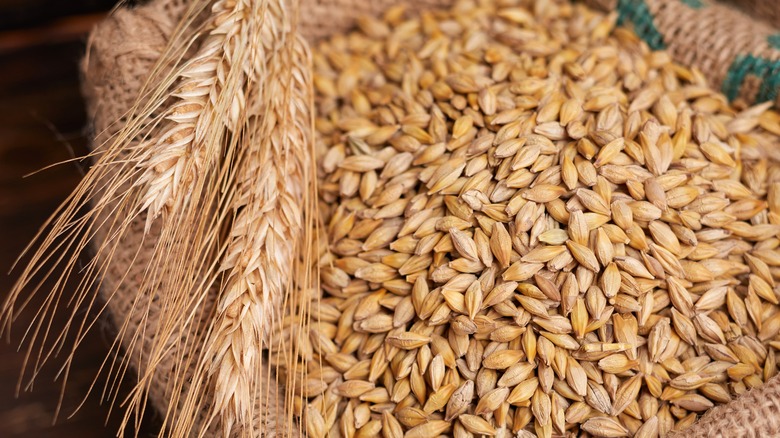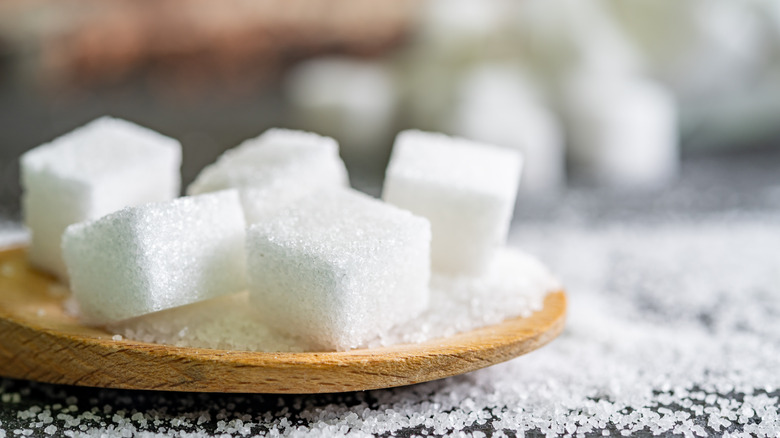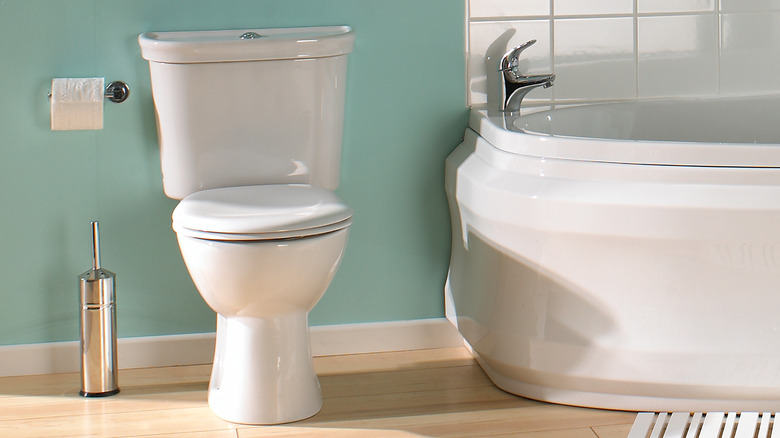Everything That's Not Healthy About Gluten-Free Snacks
With so many gluten-free versions of products like snack foods, one has to wonder if gluten is unhealthy. Well, as the Mayo Clinic explains, gluten is a type of protein. Foods like barley, rye, triticale, and wheat all naturally contain gluten. And, yes, a person might opt to follow a gluten-free diet, but that choice could be because of very specific health concerns.
According to the Mayo Clinic, one reason why someone might be on a gluten-free diet is because of an autoimmune disorder called "celiac disease." If a person with this condition eats gluten, their small intestine becomes damaged. It's also possible to have non-celiac gluten sensitivity where the small intestine isn't harmed but the individual can experience problems like headaches, abdominal pain, constipation, and diarrhea. A person can also react to gluten if they have a wheat allergy. And there's also gluten ataxia where eating gluten can negatively impact one's nerves and lead to muscle movement issues.
Besides the above health issues, sometimes a person might choose to cut gluten in an attempt to manage their weight better and/or increase their energy levels, per Mayo Clinic. However, the scientific jury is still out regarding how effective going gluten-free is for such health concerns. If you're cutting gluten because of a medical concern, talk with a healthcare professional to figure out ways to compensate for these issues.
With that said, there are some potential drawbacks to eating gluten-free foods like snacks. However, they have more to do with their nutritional content — or lack thereof.
They tend to be lower in B vitamins
As Johns Hopkins Medicine notes, if a food has gluten, then it might also contain B vitamins. In fact, it's common for manufacturers to add B vitamins to foods like breads and cereals, per MedlinePlus. So, if you're on a gluten-free diet and want to incorporate gluten-free snacks into your meal plan, you want to be careful that you're not missing out on these important nutrients.
For example, some foods contain a B vitamin called "folate" (via Cleveland Clinic). As the Centers for Disease Control and Prevention (CDC) explains, folate is an essential micronutrient. Now, you might be wondering if folate and folic acid are the same thing. Actually, folic acid is the synthetic version of folate and is added to foods like breads and cereals. However according to Harvard Health Publishing, "Gluten-free foods are commonly less fortified with folic acid ... than regular foods containing gluten." MedlinePlus notes that the body needs folic acid for cell production. Low folic acid has also been linked to birth defects; however, if you're pregnant or planning to become pregnant, work with a healthcare professional when crafting a meal plan and a vitamin regimen.
In addition, Chester County Hospital cautions that a gluten-free diet can be lacking in vitamin B12. As the National Institutes of Health (NIH) Office of Dietary Supplements explains, this B vitamin is necessary for your blood, your nerve cells, and even your DNA.
They can contain more sodium
As the Academy of Nutrition and Dietetics notes, it's common for someone to use the word "salt" when they mean "sodium" and vice versa. Technically, salt is made up of both sodium and chloride (hence why it's called "sodium chloride"), per Harvard T.H. Chan School of Public Health. No matter which term you prefer, the National Celiac Association says that if you were to compare gluten-free processed foods with their gluten-containing versions, the gluten-free ones would probably have larger amounts of salt.
Now, before we go any further, it's important to understand that sodium isn't bad. According to Harvard, we need sodium for things like our muscles to function properly. However, the Academy of Nutrition and Dietetics explains that we need to be careful about consuming too much sodium. Why? Well, sodium can lead to more water being retained in one's system. And this can put a strain on someone's organs, including the heart and the kidneys. In fact, consuming too many sodium-rich foods has been linked to high blood pressure, as well as stroke and heart disease. In addition, large amounts of sodium might have a negative impact on one's bones.
However, if you need to be on a gluten-free diet, processed gluten-free snacks might not be completely out of the question. As the National Celiac Association notes, it's important to be a conscientious consumer and opt for processed foods, "that provide less than 5% daily value of sodium." Processed foods advertising they're "low sodium" might also be good choices.
They might be lacking in whole grains
Chances are you've seen the terms "whole grains" and "refined grains" at the supermarket or where you shop for groceries online. The main difference between the two is whole grains are just that, the entire grain — meaning they have the bran, the germ, and the endosperm — while refined grains don't have the bran or the germ, per Academy of Nutrition and Dietetics. Although whole grains are touted for their nutritional properties, gluten-free diets (and by extension gluten-free snacks) can be lacking in whole grains (via Johns Hopkins Medicine).
Now in case you're thinking, "That's too bad, but are whole grains really that good for you?" keep in mind that consuming the right amount of whole grains can help one maintain healthy blood sugar levels and healthy cholesterol levels, according to Johns Hopkins. As the American Heart Association notes, they can also help with high blood pressure. Not surprisingly, whole grains can lower the chances of developing health problems like type 2 diabetes and heart disease. In addition, they can help with healthy weight management.
Does this mean gluten-free snacks should be off the menu? Not necessarily, depending on their ingredients. As MedicineNet states, there are whole grains that don't contain gluten, which could be good additions to a gluten-free diet. These include corn, amaranth, teff, quinoa, sorghum, buckwheat, and millet. Rice and wild rice are also both gluten-free. And while oats technically don't have gluten, they can become contaminated with gluten.
Gluten-free snacks can be higher in sugar
As nutritionist Rania Batayneh told GQ, "When you remove the gluten out of a food product, you're taking away the ingredient that provides that delicious, chewy texture ... ." To compensate for this, Batayneh explains that "food manufacturers often add in other fillers, including sugars ... ."
Before we go any further, it's important to realize that there's more than one type of sugar. As the National Celiac Association explains, there are natural sugars like the kind found in fruit, but there are also added sugars like high fructose corn syrup and cane sugars (honey also falls into this category). Foods can also contain sugar alcohols, which are used as sugar substitutes. With all that said, the Association notes that added sugar is what manufacturers might add to a gluten-free product to make it seem more like a gluten-containing product. Additionally, the Association advises that it's wise to be careful about consuming too much added sugar. Also, according to WebMD, consuming large amounts of sugar can increase the chances of developing health issues like heart disease and type 2 diabetes.
If you want processed snacks to be part of your gluten-free diet, then opt for ones that have little or no added sugar (per National Celiac Association). And remember, some added sugars like honey have nutritional properties so might be alright in small amounts but make sure you check with a healthcare professional.
If something is gluten-free, it can be low in magnesium
According to registered dietitian Dr. Amy Burkhart, "Gluten-free diets are notoriously low in magnesium." In fact, she explains on her website that low magnesium levels and health problems like celiac disease and non-celiac gluten sensitivity can go hand in hand. Remember, wheat contains gluten (via MedicineNet). So, naturally, someone looking to cut gluten from their diet would avoid wheat. However, as Dr. Burkhart notes, wheat bran is a great source of magnesium. Also, Dr. Burkhart states that "manufactured gluten-free foods are full of refined flours and sugars and void of this important mineral."
And not having enough of this important mineral in foods like gluten-free snacks can have a negative impact on one's health. Magnesium deficiency can lead to a number of health issues. For example, magnesium helps keep one's blood pressure normal, so not surprisingly, if a person has magnesium deficiency, they might have high blood pressure. Other possible health problems where low magnesium might be the cause include muscle spasms, anxiety, and abnormal heart rhythms.
In addition, if you're on a gluten-free diet, you should chart how much caffeine and alcohol you regularly consume. According to Dr. Burkhart, both caffeine and alcohol can lower magnesium levels, which can further compound not consuming enough magnesium. Also, chronic stress can reduce magnesium levels; so, while proper stress management is important for everyone, it's something that a person on a gluten-free diet should definitely incorporate into their life.
Gluten-free snacks can be low in fiber
As Julie Alliger, a registered dietician at Chester County Hospital, notes, the gluten-free version of snack foods like pretzels, cookies, and chips can be "low in fiber." This is not surprising considering that one source of dietary fiber is whole grains (via Mayo Clinic), which in some cases can contain gluten (per MedicineNet). However, having the right amount of fiber in your diet might not only help with various health concerns but also might help you live longer.
According to the Mayo Clinic, when most people think of fiber, they think of its benefits when it comes to constipation. However, fiber can also be beneficial if one has diarrhea. In addition, eating high but healthy amounts of fiber could help keep blood sugar levels steady, assist with weight management, and help reduce high cholesterol levels. And, yes, research does suggest that fiber could be connected to living longer. This is because fiber can lower the chances of certain health problems becoming fatal. These include cardiovascular disease, as well as every type of cancer.
If you need to cut gluten from your diet and are concerned about fiber, Massachusetts General Hospital does have some tips that might help especially with gluten-free snacks. For instance, both sunflower and sesame seeds contain fiber and are good ingredients for a gluten-free snack. Peanuts and almonds can also be good sources of fiber if you're on a gluten-free diet.
If a snack is gluten free, it might be higher in calories
As nutritionist Rania Batayneh told GQ, if you looked at the recipes for different gluten-free snacks, you're likely to find they contain higher amounts of sugar, fats, and chemical additives. This is because gluten-free foods have a different texture and flavor than their gluten-containing versions. And as Batayneh explained to GQ, "Ultimately, your gluten-free snacks end up with more calories ... ."
Now, it's important to understand that calories in and of themselves aren't bad, according to HealthySD.gov. Your body gets energy from calories; and, without them, you'd have trouble with essential, basic functions. For instance, your heart wouldn't work if you cut all calories from your diet. But, while you need calories, problems start when someone consumes larger than recommended amounts of calories and then doesn't burn off those calories through exercise or some other form of physical activity. While calorie consumption can affect weight, Harvard Health Publishing notes that two people could reduce their calorie intake but have different weight loss results because they have different metabolisms.
Instead of calorie counting, Dr. Fatima Cody Stanford, an obesity specialist and assistant professor of medicine and pediatrics at Harvard Medical School, recommends avoiding processed foods. This not only includes snacks but also meals. Additionally, sticking to an exercise routine and getting enough sleep can also help with healthy weight management.
What about iron and gluten-free foods?
According to Johns Hopkins Medicine, if a food is gluten-free, then it might be lacking in micronutrients. As the CDC explains, iron is an essential micronutrient. So, while our bodies don't require large amounts of micronutrients, getting the right amounts of them is essential to our overall health.
Specifically, we need iron for a number of functions like producing certain hormones, per the NIH Office of Dietary Supplements. Iron is also crucial when it comes to oxygen being transported via the blood and delivered to our muscles. Although our bodies do have some iron stored in case iron intake goes down, once that backup supply dips to a certain level, we can develop iron deficiency anemia, which can reduce how much oxygen the parts of our bodies receive from our bloodstream. Also, if we have iron deficiency anemia, we can experience problems like lower energy levels and difficulty concentrating, as well as become more susceptible to infections.
Additionally, the NIH Office of Dietary Supplements states, "Iron deficiency is not uncommon in the United States." It's important to note, however, that a 2001 study in The American Journal of Gastroenterology concluded that gluten-free diets might help with iron deficiency anemia. If you believe you have an iron deficiency, speak with a healthcare professional. And when selecting gluten-free foods including snacks, you might want to check their iron content.









